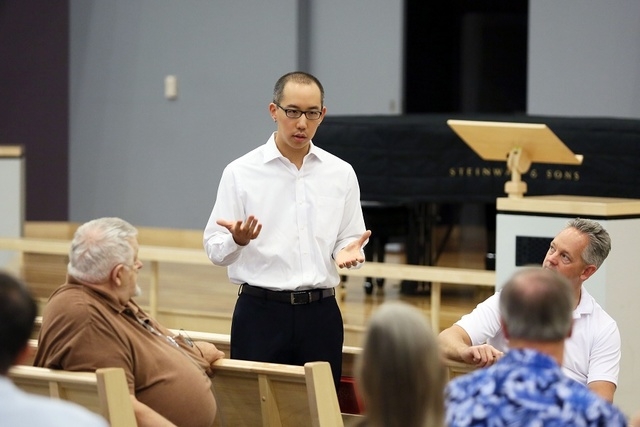Bill with ‘zero’ chance proposes privatizing provision of Medicaid services

The elderly, the blind and the physically disabled.
Thousands of people in these groups in Clark and Washoe counties face major changes in the way assistive services are provided to them should Assembly Bill 310 — sponsored by Nevada Assembly Majority Leader Paul Anderson, R-Las Vegas — become law.
The proposed changes in the bill that would privatize the provision of services have raised concerns among advocates for those who would be affected, but Anderson said last week the bill isn’t going anywhere. However, the proposed legislation remains alive in the Assembly Ways and Means Committee and has been declared exempt, meaning it’s not subject to deadlines that can quash other bills.
“We are just concerned about the transparency,” said Barbara Paulsen, whose Boulder City church is part of the advocacy group Nevadans for the Common Good. “There’s a lot of things that could be involved with this and nobody is hearing much. The bottom line, the (main concern) is the quality of care and access to care that these people have.”
The bill would require Medicaid services for the elderly, blind and disabled to be provided through managed care organizations. The services range from home health care to assisted living.
Anderson declined to be interviewed about the bill and his reasons for sponsoring it.
“The bill isn’t moving so there isn’t much of a story here,” he wrote in an email last week. He said the bill has “zero” chance of making it through the legislative process.
Those advocating and asking for more information on the bill said they have heard that even if the proposal dies, the state’s Medicaid office can request a waiver from federal officials to make that move, Paulsen said. State officials were not available to respond to that last week.
The proposed legislation went from the Assembly Health and Human Services Committee to the Assembly Ways and Means Committee, where it has been sitting since April 15. The bill has not had any hearings.
Those connected to the issue worry that should the bill pass at the last minute, people would lack necessary information on the transition. They are also concerned that the state would rush to privatize services without really scrutinizing the impact.
“It’s been done in other states, but there’s not a lot of data that can say if it’s a good move and (whether) it saves money or not,” Paulsen said. “And of course, the overriding thing is, how does it affect care to people? Are they still going to have access to care in a timely manner? We don’t really know if the managed care industry in Nevada has the capacity to manage this, so those are the things we have questions about.”
Nevada currently contracts with two national, for-profit managed care organizations, Amerigroup Community Care and Health Plan of Nevada, which is owned by UnitedHealthcare. Most of the services are for families and children.
Neither managed care organization returned calls seeking comment last week.
The proposed changes could impact about 54,000 people statewide, said Lynn Hunsinger, director of professional services for Nevada Senior Services, which provides adult day care and other services. About 4,000 people statewide receive services through waivers managed by the Aging and Disability Services Division and about 50,000 people receive services directly from Medicaid.
The state’s Division of Health Care Financing and Policy references its fiscal impact based on the assumption of a July 1, 2015 effective date in its fiscal note.
A rushed transition could lead to continuity of care problems.
“Many of these people, because of their situation, can’t speak up,” Paulsen said. “They can fall through the cracks and not get their care in a timely fashion.”
Robert Hoo with Nevadans for the Common Good, a broad-based coalition of institutions in the Las Vegas area advocating for several issues including those impacting senior citizens, said many people have just learned about the existence of the bill.
Dennis Hutson, pastor at Advent United Methodist Church, said there’s been a lack of transparency with this bill, which impedes the public’s ability to participate. But what matters most is that people receive the care they need.
“We want people’s needs to be met,” he said.
Jeff Klein, chairman of the legislative subcommittee for the state’s Commission on Aging, said the subcommittee is aware that the bill hasn’t had a hearing yet.
“We are anxious to participate in the dialogue about the implementation of Medicaid managed care in the state and how it can be crafted in a thoughtful way so that it serves our citizens well,” he said last week. Klein is also the president and chief executive officer for Nevada Senior Services.
Contact Yesenia Amaro at yamaro@reviewjournal.com or 702-383-0440. Follow @YeseniaAmaro on Twitter.

RELATED STORIES
Labor wants all public contract details revealed in Nevada
Free speech advocates oppose bill to weaken Nevada’s SLAPP law
Assembly panel hears support for gun law reform bill
Bill calls for inventory of vested water rights in dry Nevada
Clark County Commissioners, Nevada lawmakers move to reform ‘appalling’ guardianship program
Sandoval’s key tax bill clears state Senate
See all of our coverage: 2015 Nevada Legislature












